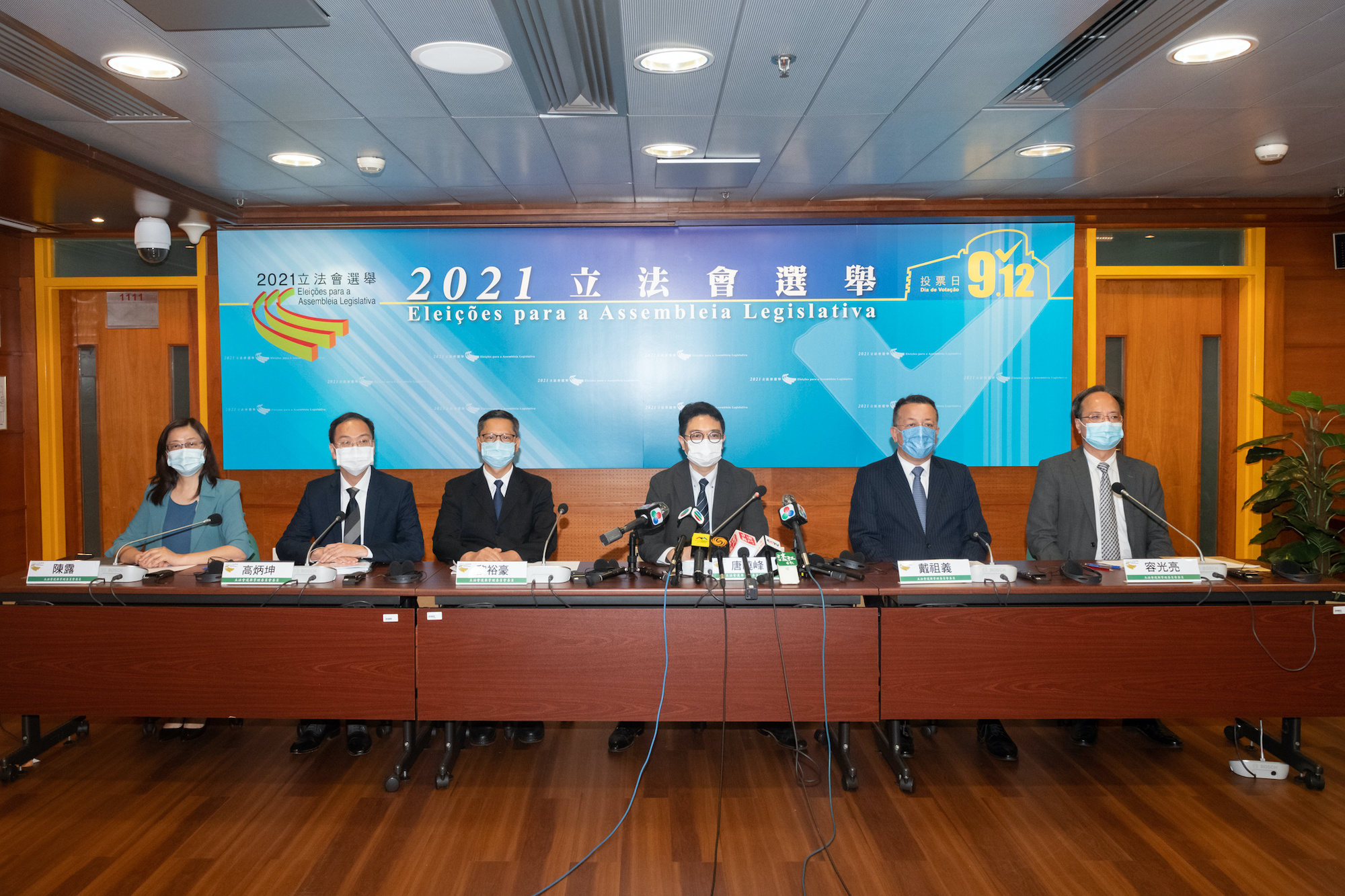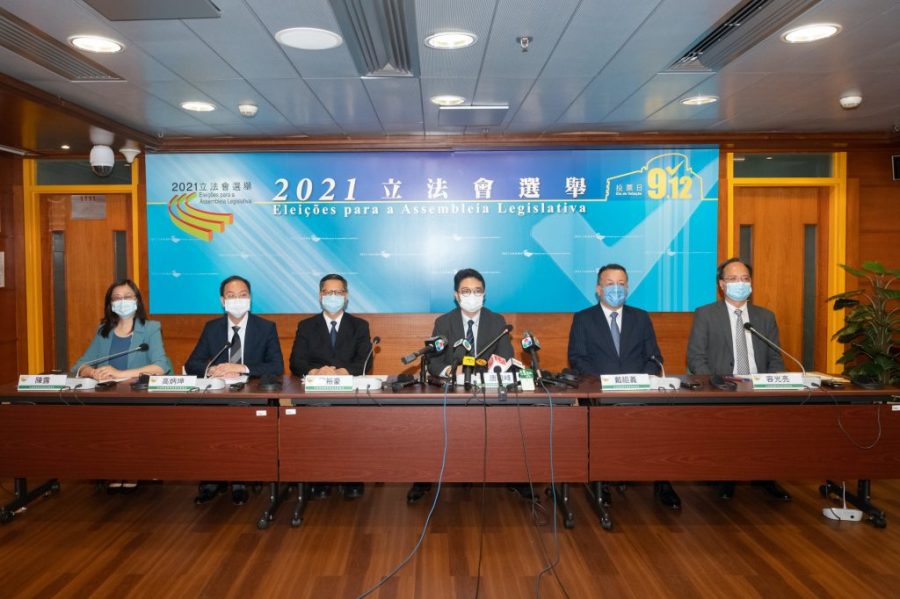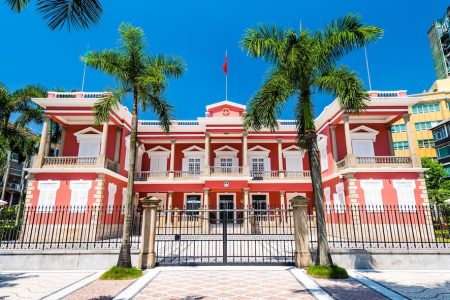The Legislative Assembly Electoral Affairs Commission (CAEAL) yesterday insisted that evidence provided by the police indicates that the 21 election candidates from six direct-election Lists who have been disqualified have failed to support the Macao Basic Law or have been disloyal to the Macao Special Administrative Region (MSAR).
CAEAL president Tong Hio Fong said that the commission used seven criteria to assess the candidates’ qualifications with the aim of ensuring that they “sincerely uphold” the Macao Basic Law and bear allegiance to the MSAR.
According to Tong, the criteria were set up in line with the principle that upholding the Macao Basic Law requires supporting the nation’s Constitution as well, The Macau Post Daily reported.
In addition, according to Tong, the standards to assess the candidates’ qualifications were made based on the principle that upholding the leadership of the Communist Party of China (CPC) is an important factor for his commission to determine whether a candidate is qualified for the Legislative Assembly elections.
The commission announced on Friday that it had disqualified 21 candidates from six direct-election Lists for failing to support the Macao Basic Law or having been disloyal to the MSAR. The commission said that even though all 159 candidates fielded by 19 direct-election Lists (candidacy groups) had formally declared their support for the Macao Basic Law and their loyalty to the MSAR when they submitted their candidacies, the commission’s candidacy qualification review process, based on evidence provided by the Secretariat for Security, discovered that the 21 candidates had failed to respect the Macao Basic Law or had been disloyal to the MSAR. As a result, the 21 candidates are ineligible to stand in the 12 September direct election.
According to Article 6 of the Legislative Assembly Election Law, those who refuse to declare that they uphold the Macao Basic Law and bear allegiance to the MSAR are ineligible to be a candidate for the direct or indirect legislative elections.
According to the same article, candidates are also ineligible to run in the elections if “facts have proved” that they do not uphold the Macao Basic Law or are disloyal to the MSAR.
Legislative election candidates must sign a declaration confirming that they uphold the Macao Basic Law and bear allegiance to the MSAR.
The commission also said that it had assessed the candidates’ qualifications also in line with the Court of Final Appeal’s (TUI) ruling early last month which backed the police’s decision to disallow this year’s 4 June vigil.
On Wednesday last week, the commission announced the preliminary acceptance of 159 candidates from 19 Lists vying for the legislature’s 14 directly-elected seats.
The 21 disqualified candidates include all 15 candidates of three Lists from the “pro-democracy” camp, which are headed by high-profile political activist Chiang Meng Hin, incumbent legislator Sulu Sou Ka Kou and former lawmaker Paul Chan Wai Chi respectively.
Six other disqualified candidates comprise two candidates from the Gaming New Macao List headed by gaming staff unionist Cloee Chao Sao Fong, two candidates from the Ou Mun Kong I (“Macao Righteousness”) List headed by veteran labour rights activist Lee Sio Kuan, and two candidates from the Macao Victory List.
The Lists that have some or all candidates disqualified had the right to replace the candidates concerned by yesterday at the latest. Alternatively, the disqualified candidates could choose to insist that they have not failed to support the Macao Basic Law and have not been disloyal to the MSAR.
If the electoral Lists concerned chose to replace their candidates, the commission would then assess their qualifications and announce its decision tomorrow. If the Lists concerned chose to insist that they have always been upholding the Macao Basic Law and always have been loyal to the MSAR and consequently will not replace their candidates, the commission will also announce its decision tomorrow as to whether it accepts the lists’ positions on the matter.
Tong said that the legislative election law’s requirement for candidates to uphold the Basic Law and bear allegiance to the MSAR means that they must be patriots. The requirement aims to ensure the full adherence to the principles established in the Basic Law, Tong said.
In order to ensure that candidates “sincerely” uphold the Basic Law and bear allegiance to the MSAR, Tong said that the legislative election law not only requires them to sign a declaration, but also requires them to not have done anything indicating that they do not uphold the Basic Law or have been disloyal to the MSAR in reality.
Consequently, Tong said, the commission has not only confirmed that the candidates have signed their respective declarations, but has also assessed whether the candidates have done anything that does not uphold the Basic Law or is disloyal to the MSAR.
The Constitution of the People’s Republic of China (PRC), which is the country’s fundamental law, is the basis for the formulation of the Basic Law, Tong pointed out, adding that upholding the Basic Law necessarily requires the upholding of the Constitution and the principles enshrined in it, such as “One Country, Two Systems”, “Macao people governing Macao”, Macao’s “high degree of autonomy”, and the leadership of the Communist Party of China (CPC).
“One Country, Two Systems” is the central government’s fundamental policy for the MSAR, and “One Country” is the prerequisite and foundation for “Two Systems”, Tong said, adding that “patriots governing Macao” is an important principle that must be strictly adhered to in order to fully and accurately implement the principle of “One Country, Two Systems”.
Consequently, Tong said, the Legislative Assembly election candidates must “sincerely” uphold the Basic Law, the nation’s Constitution and the principles enshrined in it.
“Patriots necessarily safeguard sincerely the nation’s sovereignty, security and development interests,” Tong said. “Patriots necessarily respect and safeguard the country’s fundamental system and the constitutional order of the MSAR. Patriots must not engage in any activities that jeopardise national sovereignty and security, challenge the central authorities’ power and the authority of the Basic Law, and make use of Macao to infiltrate and destroy the mainland.”
Tong pointed out that the first session of the 13th National People’s Congress (NPC) in March 2018 passed amendments to the nation’s Constitution, according to which in Paragraph 2 of Article 1 of the Constitution, after stating that “the socialist system is the basic system of the People’s Republic of China”, a new sentence points out that “the defining feature of socialism with Chinese characteristics is the leadership of the Communist Party of China”.
Tong said that the amendments fully embody the ruling position of the CPC, because of which, he said, whether a candidate upholds the leadership of the CPC has become an important factor in his commission’s candidacy qualification review process for this year’s Legislative Assembly elections.
Consequently, Tong said, the commission has set up seven criteria to assess the candidates’ qualifications.
- According to Tong, the candidates must safeguard the constitutional order established by the nation’s Constitution and the Basic Law. If facts have proved that the candidates have organised or participated in activities that intend to overturn or undermine the country’s fundamentals established by the Constitution, or have made remarks related to such activities, the commission will disqualify them, Tong said.
- Tong said, the candidates must safeguard the country’s unity and territorial integrity. If facts have proved that the candidates have committed acts that jeopardise the country’s unity and territorial integrity, or made speeches supporting secession, they will be disqualified.
- Thirdly, if facts have proved that the candidates have participated in training activities against China organised by anti-China organisations abroad, including accepting funding from such organisations, the commission will disqualify them.
- Fourthly, the candidates must not discredit the PRC and the MSAR. If facts have proved that the candidates have maliciously attacked, discredited or slandered the country or the MSAR, or have made remarks related to such activities, the commission will disqualify them, Tong said.
- Tong said, the candidates must not engage in any activities that jeopardise national sovereignty and security. If facts have proved that the candidates have violated the local national security law – the Law on the Defence of National Security (Law 2/2009), they will be disqualified, Tong said.
- Tong said that if facts have proved that the candidates have maliciously attacked or discredited the legislation, interpretations and decisions passed by the NPC or its Standing Committee, they will be disqualified.
- According to Tong, candidates who have provided support or assistance for others to perform the activities mentioned in the first six points will also be disqualified.
Tong repeatedly reaffirmed that criticising the administration of the Macao government is not regarded as failing to uphold the Basic Law or being disloyal to the MSAR, so candidates who have done so are qualified to run in the 12 September election.
Tong also repeatedly underlined that for the time being the commission could not reveal further details as to the reasons why particular candidates have been disqualified as otherwise, it would have affected their appeals to his commission and their possible appeals to the Court of Final Appeal (TUI).
Meanwhile, Tong said that only one List, whose identity he did not reveal, had requested to be allowed to replace its candidates.
Representatives of the six Lists went to the commission’s office in the Public Administration Building yesterday, and five of the representatives said that they had told the commission that they insisted on their stance that they should not be disqualified from running in the election. Only the Macao Victory List representative declined to confirm his List’s position on the matter.






